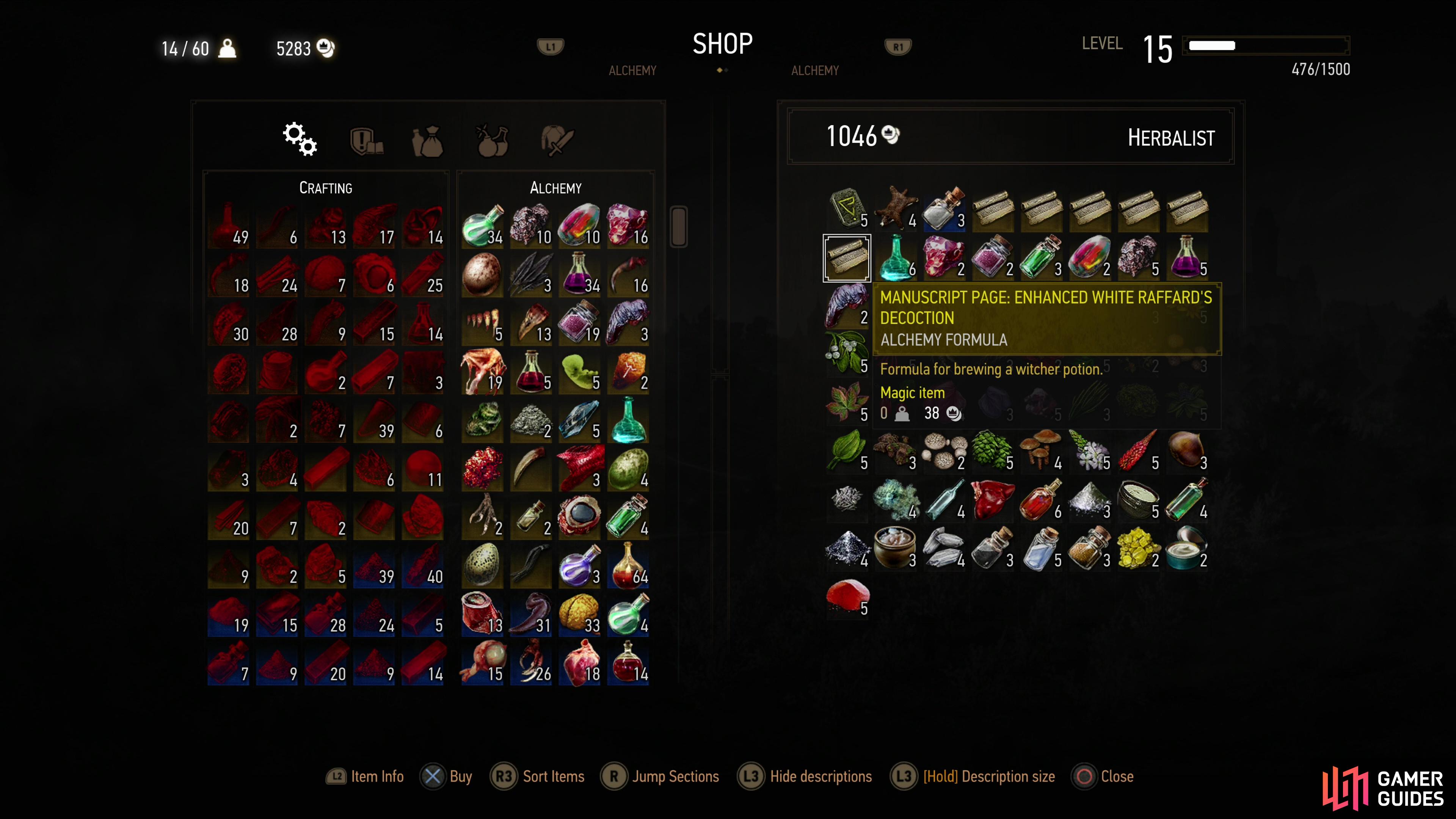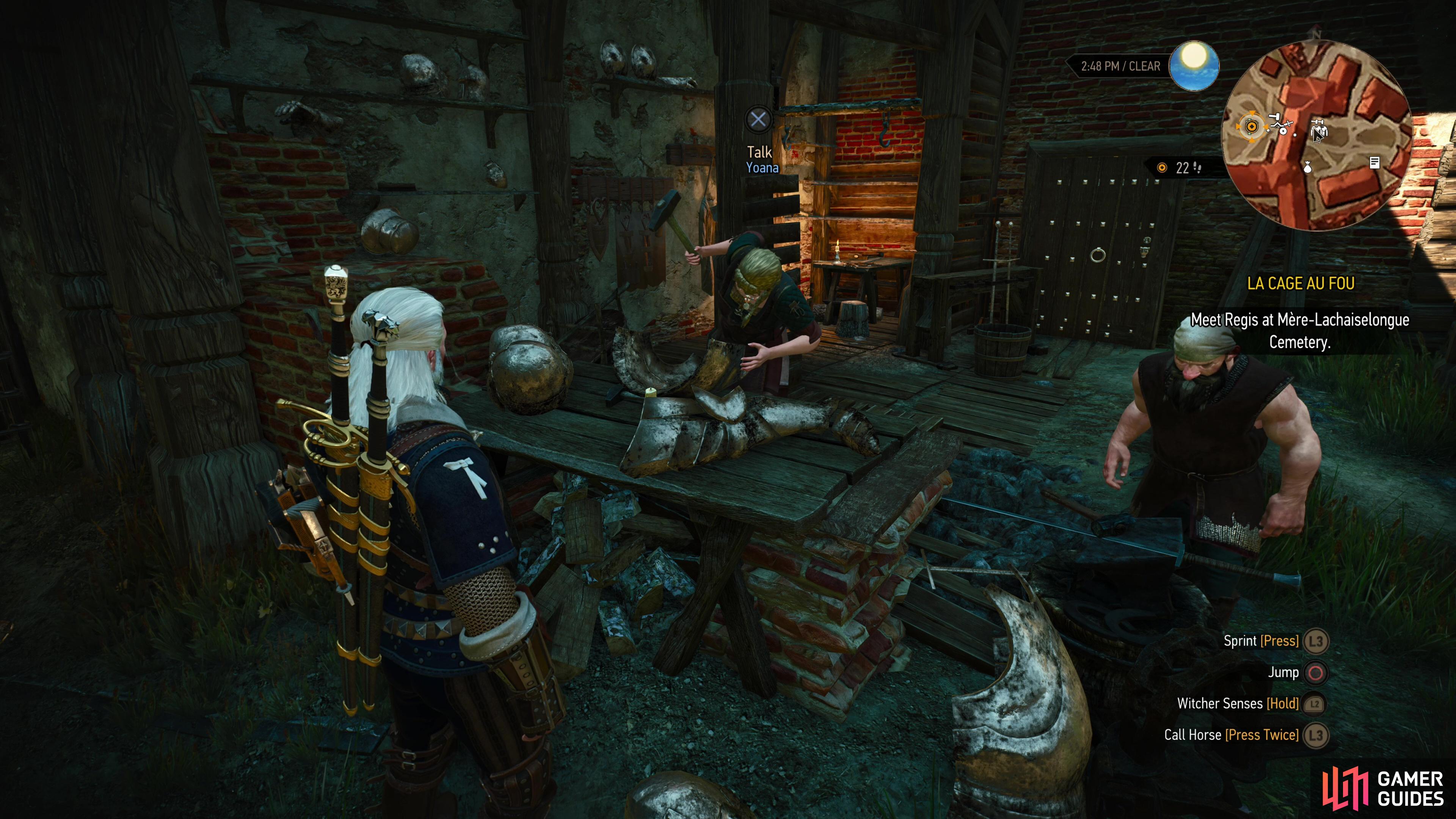The crafting system in The Witcher 3 is pretty simple. As you explore you’ll find (or will be able to buy) diagrams, formula, manuscript pages… even the odd book. All of these teach you new items you can craft… with some provisions.
How to Craft In The Witcher 3¶
You will typically need two things to craft items:
 Diagrams/formulas
Diagrams/formulas- Materials depending on item type
Usually merchants sell diagrams/formula that reflect their wares: blacksmiths sell armor, weapons and diagrams and herbalists sell potion/bomb/oil/decoction recipes, for example. The plans merchants sell are static, but the ones you find in the wilderness are not, so you can’t always count on having a specific potion, oil, or diagram… unless you’re really thorough about completing events and side-quests.
(1 of 2) Craftsmen can creature new weapons and armor for you, and you can concoct new potions, oils, bombs and decoctions,
Craftsmen can creature new weapons and armor for you, and you can concoct new potions, oils, bombs and decoctions, (left), but first you need to find or buy diagrams, formulae and plans. (right)
In addition to plans, you’ll need materials to craft items. Ore, leather, monster bits, herbs, alcohol, etc. Most of this stuff is pretty common, and again, if you search thoroughly, and break down items that have uncommon components (gem dust, rare metals, etc) you’ll have more than enough… at least, later on, when you actually need it. Simple enough. But there’s more. Only Armorers can craft armor, and only Blacksmiths can craft weapons. There are also three grades of craftsman: Amateur, Journeyman, and Master. There’s only one master craftsman of each type in the game, and you have to complete quests to get them to work for you. Complete “Of Swords and Dumplings“ to gain the services of the master blacksmith (weapons), finishing “Master Armorer“ will allow the master armorer to craft for you, and satisfying the demands of the master alchemist during “Practicum in Advanced Alchemy“ will allow you to buy many of the best rune, glyph, potion, oil, and decoction plans from him.
(1 of 3) You’ll have to help out master craftsmen in order to get them to provide their services. Hattori, the master weaponsmith can be found in Novigrad,
Crafting Armor and Weapons¶
Crafting Types¶
Armor: Armor helps keep a Witcher alive, while preferably being light and comfortable… or at not too uncomfortable. Armor is split into four parts-Armor, Boots, Gauntlets and Trousers.
Crafting Components: To make all those wonderful weapons and armor you’ll need to kill monsters more effectively, you need components. Components can be found carelessly strewn throughout the world, in various container. Other weapons and otherwise useless items can also be dismantled for components. Sometimes that just doesn’t suffice, though. When that happens, you can visit a craftsman and have them forge your lesser components (most of which can be purchased from various craftsmen) into rarer ones. You will begin the game with most of the Crafting Component plans.
![]() Crossbow
Crossbow ![]() Bolts: Sometimes those infinite, mundane Crossbow Bolts you always seem to have at the ready just won’t cut it… okay, that’s a lie, you never need to make these unless you’re hunting for Achievements/Trophies.
Bolts: Sometimes those infinite, mundane Crossbow Bolts you always seem to have at the ready just won’t cut it… okay, that’s a lie, you never need to make these unless you’re hunting for Achievements/Trophies.
![]() Silver Swords: Silver Swords are the primary tools of the trade for a Witcher. Monsters are resistant to steel, and as professional monster hunters, it’s silver, or go home.
Silver Swords: Silver Swords are the primary tools of the trade for a Witcher. Monsters are resistant to steel, and as professional monster hunters, it’s silver, or go home.
Steel Swords: While Witchers are professional monster hunters, for some Witchers can’t seem to avoid politics. Geralt is one of those Witchers, so keep your Steel Sword in good condition to fend off the humans and nonhumans who will pose as much of a threat as any Necrophage will during your travels.
Tools: You break down all those heavy repair kits and you’ll recover… components needed to build the same repair kits. Yeah… not really worth your while.
Upgrades: Upgrades consist of Runestones and Glyphs, which can be inserted into weapons and armor to improve them. Typically it’s less of a hassle to just buy the best versions from merchants, but if you find yourself with an abundance of lesser versions in your inventory, it might be worth upgrading them.
Witcher Sets: Some of the best armor and weapon plans in the game aren’t random, however, and are the subject of special quests - these are the “Witcher School” quests. There are three Witcher School gear sets (in the vanilla game, at least) and are well worth getting, as they tend to be quite a bit stronger than most other armors and weapons in the game. These are: ![]() Cat (Feline),
Cat (Feline), ![]() Griffin, and Bear (Ursine), light, medium, and heavy armor, respectively.
Griffin, and Bear (Ursine), light, medium, and heavy armor, respectively.
Potion Crafting¶
Alchemy Types¶
Alchemy Substances: Alchemy Substances consist of two types of items: Mutagens, and Alchemy Ingredients. Mutagens can be combined with one another to create more powerful versions, while Alchemy Ingredients are required to create the most powerful Potions and ![]() Oils.
Oils.
Alcohol: A pretty small and useless category, you’ll find plenty of ![]() Alcohest and Dwarven Spirit all over the place. They’re useful for replenishing expended Potions, Bombs, and Decoctions, but you never need to craft them.
Alcohest and Dwarven Spirit all over the place. They’re useful for replenishing expended Potions, Bombs, and Decoctions, but you never need to craft them. ![]() White Gull, on the other hand, is needed to make many of the more uncommon Alchemy Ingredients, which in turn are needed to upgrade more powerful Potions and Oils. The two rare components in White Gull - Cherry Cordial and Mandrake Cordial - can be purchased from various
White Gull, on the other hand, is needed to make many of the more uncommon Alchemy Ingredients, which in turn are needed to upgrade more powerful Potions and Oils. The two rare components in White Gull - Cherry Cordial and Mandrake Cordial - can be purchased from various ![]() Innkeeps. Otherwise, don’t expect to find too many in your travels
Innkeeps. Otherwise, don’t expect to find too many in your travels
Bombs: Bombs are good for… well, blowing things up, ideally. When created, you’ll get a limited number of them to use (they can be replenished by resting, where you’ll automatically use alcohol to concoct more) - higher grades of bombs will have more numbers in a stack. Throw them at enemies or use them to blow up ![]() Monster Nests. Depending on the bomb, they do everything from causing brute damage, to applying status effects.
Monster Nests. Depending on the bomb, they do everything from causing brute damage, to applying status effects.
Decoctions: Decoctions are like Potions - you drink them and you gain some passive effect. Unlike Potions, however, Decoctions tend to last quite a long time (even over an hour with some upgrades) and have much more toxicity. Their effects tend to be less potent, as well. You won’t really be able to make full use of them unless you increase your max Toxicity, but if you do, you can pop one for a long-lasting buff.
Oils: Oils in The Witcher 3 are incredibly useful. You apply them to your swords (this uses up no charges, and costs you nothing besides the initial cost of crafting the oil) and you get a damage bonus against a specific foe based upon the grade of the oil-either 10%, 25% or 50%. These are hefty, free damage bonuses that only take a little foresight to gain. It’s well worth your while to keep your Oils updated, and to apply them liberally.






 Sign up
Sign up
No Comments